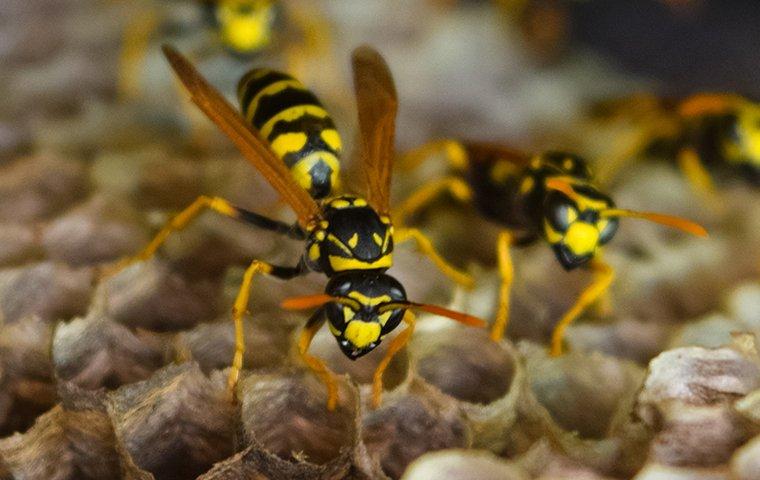How much do you know about wasps? Do you know that all hornets are wasps? It's true. All hornets are part of the wasp family. Do you know that most wasp species are not aggressive? Yup. There are more solitary wasp species than there are social wasp species. That's good news, since social wasps swarm and protect their nests. Are you aware that wasps have a beneficial role to play in nature? While wasps are a stinging hazard, they're actually really good to have around—even the social species. They help with pollination, and they prey on many other pests that can come into your yard. As long as they establish their nests away from human and animal activity, they can be an essential piece in the pest management puzzle. So, it is very helpful to understand why wasps come into your yard and why they might be inspired to create a nest because keeping wasps in their place can allow them to continue to be a benefit without causing a threat to you or your family. Here are five smart wasp management tips to consider.
Trash Management
Wasps eat protein. While they're going to find most of the protein they need by hunting down bugs, they can find food to eat in your trash bins. Protecting your trash and reducing smells that attract wasps can have a big impact on wasp activity.
-
Keep bagged trash in covered containers.
-
Keep dumpster covers closed.
-
Remove trash routinely to avoid having too many bags and preventing the lid from closing.
-
Clean your receptacles routinely to keep the odor from attracting wasps.
Addressing Moisture Problems
There are many ways moisture can lead to wasp problems. Some may actually surprise you.
-
Wasps drink water from puddles. If you have conditions that cause puddles, such as clogged gutters, compacted ground, or leaky water hoses, you'll attract wasps.
-
Wasps feed on the honeydew of aphids and other plant-damaging insects. If you have unhealthy plants (due to overwatering, lack of fertilization, etc.) you're likely to have trouble with wasps.
-
Wasps eat bugs, and many bugs are attracted to moist conditions. Trim your landscaping and remove unnecessary vegetation to prevent moisture from being trapped.
Removing Flowery Weeds
Wasps eat nectar. While you probably don't want to remove the flowers from your landscaping, getting rid of flowery weeds in your landscaping is a good way to manage wasps without removing desirable plants. All of those little flowers on all those little weeds offer a food source for wasps to feed on. Those weeds also increase the moisture in your landscaping. These are two good reasons to deal quickly with flowery weeds.
Sweet Smells
Wasps can be attracted to your property by sweet smells. This works in a similar way to how the smell of trash will lure them to your property in search of protein sources; the smell of perfume or incense can lure them to your property in search of sweet nectar. They'll also be drawn to a soda can or juice cup left out on your deck.
Remove Harborage Options
Some wasp species establish nests in holes and voids. If you fill ground holes and seal entry points in exterior structures, you can make it more difficult for these wasps to create a nest on your property.
Prevent Nests With Routine Inspections
There is no better way to keep wasps from establishing a nest in your Hendersonville yard than to invest in Perimeter Plus Pest Protection from All-American Pest Control. With this service, you get routine inspections of your property—and that means wasps won't get a chance to sneak up on you! Reach out to us anytime to schedule a free home evaluation to get started.
 1426 Reviews
1426 Reviews


